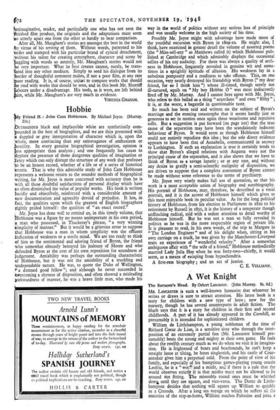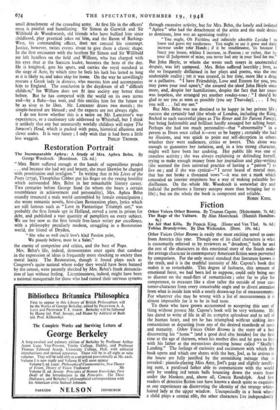A Wet Knight
The Saracen's Head. By Osbert Lancaster. (John Murray. 8s. 6d.) MR. LANCASTER is such a well-known humorist that whatever he writes or draws is sure to attract attention. His latest book is a story for children with a new type of hero ; new for the nursery, though he has several counterparts in adult fiction. The blurb says that it is a story for children in their first and second childhoods. A part of it has already appeared in the Cornhill, so presumably it is intended for sophisticated children.
William de Littlehampton, a young nobleman of the time of Richard Coeur de Lion, is a sensitive sissy who through the inter- position of an extremely partial fate (Mr. Lancaster himself pre- sumably) beats the strong and mighty at their own game. He feels about the twelfth century much as we do when we visit it in imagina- tion. He is frightened of boars and boarhounds, he can't keep a straight lance at tilting, he hates singlestick, and his castle of Cour- antsdair gives him a perpetual cold. From the point of view of his family, and especially of his bumptious games-playing young cousin Leofric, he is a " wet" and a misfit, and if there is a rule that the world observes strictly it is that misfits mu3t not be allowed to lie around not fitting. The miserable round ones must be whittled down until they are square, and vice-versa. The Dame de Little- hampton decides that nothing will square up William so quickly as a Crusade. After a long sea voyage on which he suffers all the anxieties of the stay-at-home, William reaches Palestine and joins a small detachment of the crusading army. At first life in the officers' mess is painful and humiliating. Sir Simon de Gatwick and Sir Willibald de Wandsworth, old friends who have bullied him since childhood, play practical jokes on him, and the Baron of Barking- West, his commanding officer, does not .conceal his contempt. Justice, however, twists events about to give them a classic shape. In the first encounter with the heathen Sit- Simon and Sir Willibald are left headless on the field and William, who has charged with his eyes shut at the Saracen leader, becomes the hero of the day. He is knighted, gets his spurs, and carries the royal standard at the siege of Acre, by which time he feels his luck has lasted as long as it is likely to, and takes ship for home. On the way he unwillingly rescues a Greek lady in distress, who marries him and accompanies him to England. The conclusion is the daydream of all " difficult children," - for. William does not fit into society any better than before. But he has competed with, the world on its own terms and—by a fluke—has won, and this entitles him for the future to be as sissy as he likes. Mr. Lancaster draws two morals ; the simple-hearted are blessed ; and the experts are not always right. I do not know whether this is a satire on Mr. Lancaster's war experiences, or a cautionary tale addressed to Whitehall, but I think it unlikely that any but unnaturally worldly children will enjoy The Saracen's Head, which is packed with .puns, historical allusions and clever asides. It is very funny ; I only wish that it had been a little



































 Previous page
Previous page